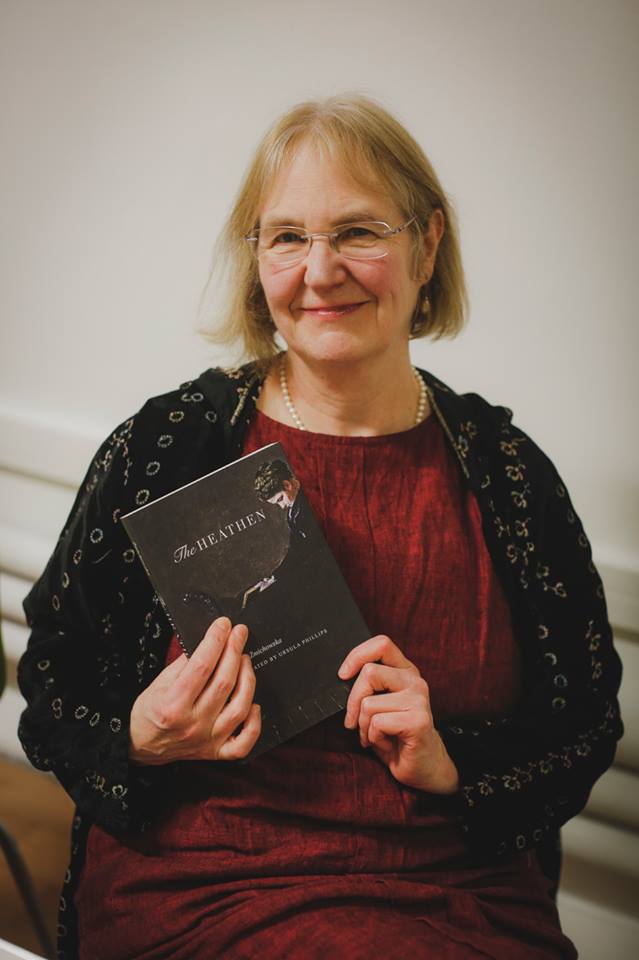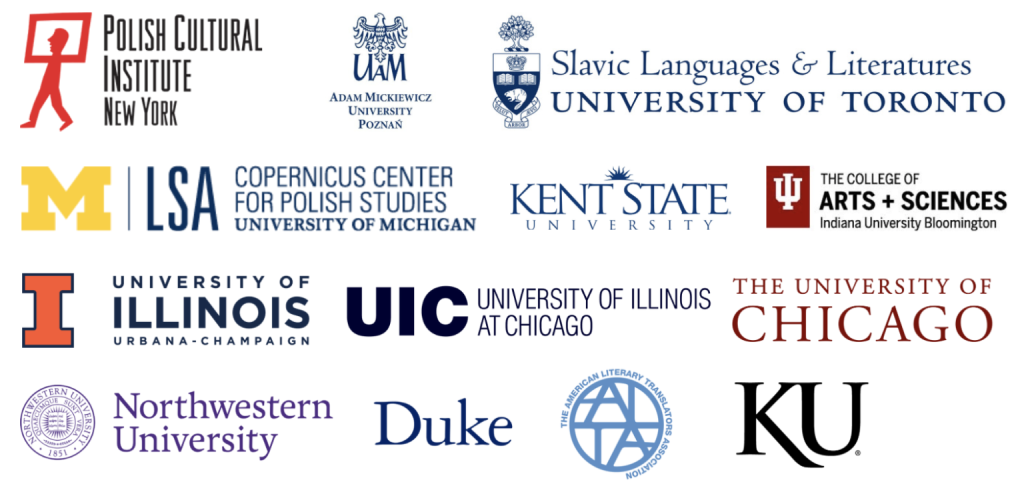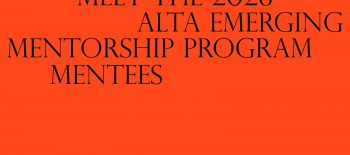Episode 22 and all video recordings are available at:
Polish Cultural Institute New York YouTube
Encounters with Polish Literature is a video series for anyone interested in literature and the culture of books and reading. Each month, host David A. Goldfarb will present a new topic in conversation with an expert on that author or book or movement in Polish literature. More about the Encounters with Polish Literature series and the timeline.
Narcyza Żmichowska (1819-76), known also by the pen name “Gabryella,” is perhaps the first Polish writer we can recognize as a feminist in the modern sense. She was born in Warsaw in the Congress Kingdom under the Russian partition, the youngest of nine children, and her mother died shortly after her birth. Her father did not take responsibility for her, leaving her to the care of her elder siblings, with whom she was very close, and various relatives. She worked as a governess for the wealthy Zamoyski family, spending over a year in Paris where she had access to the Bibliothèque Nationale and a chance to greatly advance her own self-education. She moved in democratic (anti-tsarist) and socialist circles (landing in prison and under house arrest in Lublin for two years), maintained an extensive correspondence, largely with a group of similarly-minded intellectuals known as the “Enthusiasts,” and wrote poetry, stories, and several novels including The Heathen, A Book of Memories, A Double Life, The White Rose, and Is this a Novel? Later in life, she was most active as a teacher and author of textbooks, aimed primarily at the education of girls.
In this episode we look primarily at her novel, The Heathen (Poganka, 1846), the first to be translated into English. We consider her ideas about art and representation, the meaning of love, the relation of the novel to Plato’s Symposium,gender fluidity, and what exactly constituted “enthusiasm” in Żmichowska’s context. We look at details from her biography and evidence from her letters that help to explain these questions in the novel.
Many thanks to Ursula Phillips for providing the bibliography for this episode. Academic books are often priced more for libraries than individuals. If you are affiliated with an academic institution, your research library can usually help you find these materials either in their own collections or through interlibrary loan (ILL). If you don’t have an academic affiliation you may have access to a research library at a public university in your area, and there are large public libraries in major cities that can make use of ILL with other research libraries. ILL can seem intimidating, but it’s actually not so difficult, and by keeping these books in circulation, you’re helping to make them available to future readers and scholars, by showing the libraries that own them that they are needed and should not be discarded.
Material on Żmichowska in English:
Grażyna Borkowska. 2001. Alienated Women: A Study on Polish Women’s Fiction 1845-1918. Translated by Ursula Phillips. Budapest: Central European University Press, pp. 23-188.
Grażyna Borkowska. 2010. “Conversation as Female Experience: The Case of Narcyza Żmichowska.” In Mapping Experience in Polish and Russian Women’s Writing, edited by Marja Rytkönen [et al.], pp. 32-49. Newcastle upon Tyne: Cambridge Scholars Press.
Grażyna Borkowska. 2021. “Narcyza Żmichowska: Building the Foundations and the Role of Women.” In Wheels of Change: Feminist Transgressions in Polish Culture and Society, edited by Jolanta Wróbel-Best, pp. 65-75. Warsaw: Warsaw University Press.
Ursula Phillips. 2005. “Femme Fatale and Mother-Martyr: Femininity and Patriotism in Żmichowska’s The Heathen.” In Gender and Sexuality in Ethical Context: Ten Essays on Polish Prose, edited by Knut Andreas Grimstad and Ursula Phillips, pp. 19-51. (Slavica Bergensia 5) Bergen: Department of Russian Studies, University of Bergen.
Ursula Phillips. 2008. “Authorship and Masquerade in Narcyza Żmichowska’s White Rose Texts.” In Masquerade and Femininity: Essays on Russian and Polish Women Writers, edited by Urszula Chowaniec [et al.], pp. 72-92. Newcastle upon Tyne: Cambridge Scholars Press.
Ursula Phillips. 2014. “Narcyza Żmichowska’s Novel from Life: Czy to powieść? (Is This a Novel?) (1876).” The Polish Review 59:1, pp. 17-34.
Narcyza Żmichowska. 2012. The Heathen, translated by Ursula Phillips. DeKalb IL: Northern Illinois University Press.
To readers of Polish, the following may also be of in interest:
Ursula Phillips. 2008. Narcyza Żmichowska: Feminizm i religia. Warsaw: Instytut Badań Literackich Polskiej Akademii Nauk.
Dezorientacje: Antologia polskiej literatury queer. Wstęp, wybór, opracowanie Alessandro Amenta, Tomasz Kaliściak, Błażej Warkocki, pp. 101-111. Warsaw: Wydawnictwo Krytyki Politycznej, 2021. The anthology includes passages from Narcyza Żmichowska’s novel White Rose (1858), a letter to Izabela Zbiegniewska (1873) in which she describes her circle of close female friends from 1840s, and an early poem. It also includes excerpts from Tadeusz Boy-Żeleński’s text “Romans Gabryelli” (1928) on Paulina Zbyszewska as the inspiration for Aspasia in The Heathen, as well as Irena Krzywicka’s review of the 1920s reprints of her novels entitled “Rozmowa kobiet o Narcyzie Żmichowskiej” (1929).
Anna Dżabagina. 2022. “Zniszczenie i tajemnica.” Dwutygodnik 336, June 2022.

Ursula Phillips has a background in both Russian and Polish studies, and a doctorate from the Institute of Literary Research of Polish Academy of Sciences in Warsaw (IBL PAN). She worked for twenty-three years as an area specialist librarian in the School of Slavonic and East European Studies, which since 1999 has been part of University College London where she remains an Honorary Research Fellow. For the past eighteen years she has worked primarily as a translator of academic and literary works from Polish and has pursued research primarily on Polish women writers of 19th and early 20th century. She was the first English-language translator to take on one of the ambitious novels of Wiesław Myśliwski, The Palace, published by Peter Owen Publishers in 1991. More recently she translated Maria Wirtemberska’s early 19th-century novel, Malvina, or the Heart’s Intuition, and also Narcyza Żmichowska’s novel, The Heathen, both published by Northern Illinois University Press, along with two novels by Zofia Nałkowska, Choucas and Boundary. Her latest published translations include Grzegorz Niziołek’s The Polish Theatre of the Holocaust (Bloomsbury, 2019) and Another Canon: The Polish Nineteenth-Century Novel in World Context, edited by Grażyna Borkowska and Lidia Wiśniewska (LIT-Verlag, 2020). She has co-edited several collections of essays on Polish Literature, including three on women’s writing with Urszula Chowaniec. Her most recent edited volume was Polish Literature in Transformation, edited by Ursula Phillips, with the assistance of Knut Andreas Grimstad and Kris Van Heuckelom (LIT-Verlag, 2013), which addressed developments in Polish literature 1989-2012. Her translation of Ptasie Ulice (Bird Streets) by Piotr Paziński will be published in November 2022 by Vine Editions. She is currently translating Jacek Dukaj’s novel, Ice.
Bartek Remisko, Executive Producer
David A. Goldfarb, Host & Producer
Natalia Iyudin, Producer
Lead image: Narcyza Żmichowska by Karol Beyer, 1860s.




